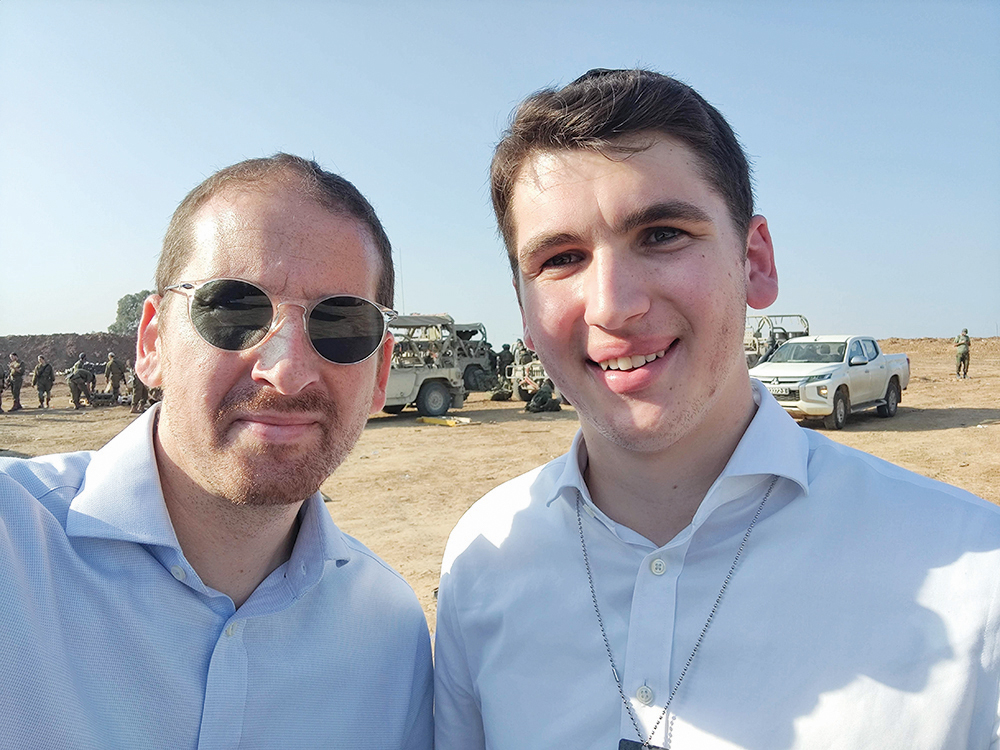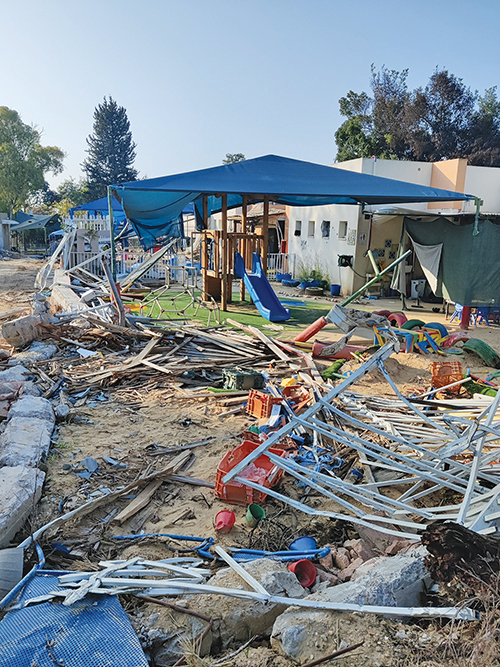
Stepping out of the car, Uri Schneider felt the air as it hung heavy with ash, settling on his skin, the dust of what was Be’eri. It still is Be’eri, will always be Be’eri, its rolling fields of grass and trees bearing witness to the tragedies of October 7, silent testimonies that go unsaid.
There in the air are the souls of the hundred-plus victims, the residents who died for the crime of being a Jew, of living in our promised land. They linger, hovering above the ravaged homes, the burnt kitchens and bullet-maimed walls. They lurk in the one remaining sukkah, the temporary hut a family built for the holiday that has now become a permanent fixture of the devastation, vague and withered, like the families who once sat within. Be’eri, which made it a day past its 77th birthday.
They were people who were largely invested in Palestinian rights, in living peacefully and assisting many to cross through the border between Gaza and Israel for work and healthcare. But these things didn’t matter to the terrorists. They were all a blur of Jews equally guilty for being Jewish.
Uri, originally from Riverdale, but now living in Ramat Beit Shemesh, glanced at his phone. An image came up from Waze urging him to “Drive Safely. Your destination is in a dangerous area. Use extreme caution.” He ignored this, and met up with a young IDF soldier, Itay, a resident of Be’eri who was off for the day from his position on the front lines of Gaza to take volunteers and visitors through the kibbutz. Uri, on a mission to contribute and spread light through the country, had been spending the past two months volunteering, such as visiting family members of the deceased, digging graves and sharing uplifting stories and photos in a WhatsApp group. He had come to Be’eri that day to visit and learn, to bear witness to the tragedies that were hidden under the overturned tables, the torn sofas, behind the metal doors of the infringed safe rooms.

Uri thanked Itay for his time, for spending his day off, a day for personal care and perhaps being with family, showing him around the kibbutz. With precision, Itay said, “I have no choice. I have to do this.”
Two months prior, Itay had been at the Nova festival, and as the music swayed through his limbs, and the sounds of rockets mixed with the thumping of the beat, his grandmother was killed and his cousin was taken as a hostage. Itay escaped the carnage of the festival, but is still trapped in the emotional destruction of that day, straddling the world of the free and the imprisoned.
Inside the homes, inside the formerly pristine kitchens, their feet crunched on smokey ashes, like brittle pieces of weathered campfires. Charred splinters, like daggers, the devil’s claws, mixed in with some recognizable items, the partial pages of a singed passport that will never travel again. The debris coats the floors of all the rooms, blanketing the carpets and smooth tiles. Except one room in each home is swept clean. The safe room. The safe room, that for some, wasn’t so safe, because there were no locks. It is meant to protect from rockets and bombs, not direct human contact.
And so, the safe rooms are swept clean by Zaka, in case therein lies remnants of humanity that deserve a dignified burial. Splinter by splinter, drop by drop, removed, and put to final rest, from behind the closed doors, their final hiding place.
The canvas walls of the lone sukkah flutter open and closed, in the occasional drifts of warm air that seep through the steely quiet of the town, breathing, inhaling in the welcomed guests who are now but a faint memory of the joyous moments.
Weaving in and out of homes, down desolate roads, with abandoned bikes of the kids who once roamed free, Itay led this group of people. He illuminated the stories of the families, now dispersed, of the wellness center where all of the injured from the attack congregated, seeking assistance, only to be attacked once again. They somberly stopped outside a house, a skeleton of its former vibrancy, and Uri, always looking for ways to infuse the moment with potential, suggested they pause to say Kaddish, to elevate the souls of those who now lingered in the eaves of the white-tiled roofs above, straddling this world and the world to come.
The quorum of men stood still, crying along with the words being rhythmically chanted, a hymn of the mourners. It was through a mix of tears and devotion that the words seeped from his mouth, pulsating through the air, liberating the trapped souls, and freeing his own.

Uri, Itay and the rest of the group, united in their mission to spread peace and unity, a beautiful blur of Jews.
Sarah Abenaim is a writer, life coach and journaling workshop curator, who lives with her husband and kids. To be featured in one of her “Out There, In Here” stories, please reach out to her at SarahAbenaim@gmail.com or to David Siegel at djs.siegel@gmail.com. To learn more about how you can make an impact in the war effort, check out https://tinyurl.com/Rinat-VolunteeringinIsrael.











